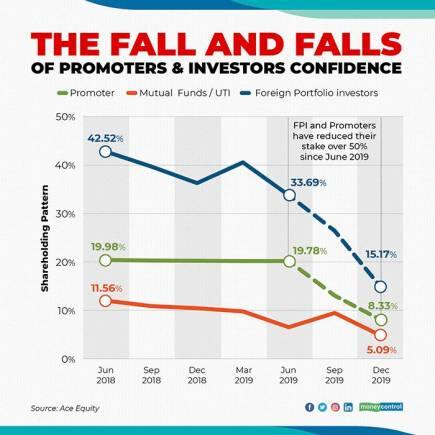



Going by the data, institutional investors might have been the first to pick the trend in Yes Bank. Since the September 2018 quarter (Q3FY18), foreign institutional investors (FIIs) and mutual funds (MFs) reduced stake in the bank by more than 50 percent, data from AceEquity showed.
MF managers offloaded their shares from 10.55 percent in September 2018 quarter to 5.09 percent in December 2019 quarter (Q4FY19). A similar trend was also seen in FIIs, who reduced their stake from 39.5 percent in September 2018 to 15.17 percent recorded in December 2019, data showed.
The fall in data also corresponds with the price action seen in Yes Bank. The bank which was listed on bourses back in 2005 touched a high of Rs 404 on August 20, 2018, but since then it has been heading south.
Investors lost more than Rs 5000 crore of market wealth in terms of market capitalisation on the BSE in a single trading session as the stock plunged 56 percent on the BSE to Rs 16.20.
Also read - Yes Bank rescue plan: RBI announces draft scheme of reconstruction
What triggered the sharp move in Yes Bank and markets? The Reserve Bank of India (RBI) on March 5 placed a temporary moratorium on Yes Bank for a period of one month till April 3, 2020 and restricted deposit withdrawal to Rs 50,000 per customer which created a panic like situation.
Most brokerage firms have placed the stock in the sell category and advise investors to stay away. The stock recovered from the lows after reports of a rescue plan surfaced.
The RBI on March 6 placed a draft scheme of reconstruction of Yes Bank in the public domain. State Bank of India (SBI) has expressed its willingness to invest in Yes Bank and and participate in its reconstruction scheme, it said.
Some of the measures introduced include altering the authorised capital to Rs 5,000 crore and also reducing the number of equity shares to 2,400 crores with a face value of Rs 2.
In a press release, Yes Bank assured its depositors that the bank is also taking necessary steps to ensure seamless transactions for the customers. “We assure the depositors that their money is safe and there is absolutely no reason to panic,” it said.
Also read: Yes Bank share price recovers nearly 200% from intraday low; brokerages suggest 'sell'

The National Stock Exchange (NSE) in its circular said that no Future and Options (F&O) contracts shall be available in the Yes Bank for trading in the equity derivative segment from May 29, 2020, onwards.
The existing F&O contracts, across all expiries, shall expire on May 28, 2020.
On March 5, JP Morgan slashed the target price on shares of the bank to Re 1 (from Rs 55 earlier) and retained its underweight call as the brokerage believes the net worth is largely impaired.
According to JP Morgan, the sovereign bailout is a bondholder/depositor bailout and not an equity one. It believes that the net worth is largely impaired and rally in the stock is unjustified.
The RBI has stepped in and leading state-owned institutions are patching up a bailout plan for the bank and more importantly, safeguard the interest of depositors, but sentiments have already turned negative.
"The restoration will be done swiftly within the 30-day time frame to finalise the bailout plan as per RBI Governor. Just like the large National Company Law Tribunal (NCLT) cases, a bailout involves bringing in fresh equity at extremely beaten-down value (like | 1-2) by the fresh buyer,” ICICI Securities said in a note.
“Accordingly, minority shareholders will be reduced to a very small percentage stake from the current large position. In all cases, minority shareholders are set to lose and recommend that existing shareholders exit positions. We rate the stock as Sell (from Reduce earlier),” it added.
The already weak sentiments have been dented further. Investors should assess the damage in their portfolio. The right time to sell the stock was long gone. If you have significant exposure to Yes Bank then it makes sense to hold, else applying exit strategy is still a better play, suggest experts.
"Given the size of SBI and Life Insurance Corporation of India (LIC), it will be a small investment compared to their balance sheet size and therefore should not be a cause of worry for SBI's investors," Umesh Mehta, Head of Research, Samco Securities told Moneycontrol.
"However, the upside could be huge for them given that Yes Bank is a significant player in the private sector with a loan book size of Rs 2.2 lakh crore. As far as Yes Bank’s shareholders are concerned, the ideal time for a selloff was when Rana Kapoor sold around levels of Rs 60/share," he said.
Mehta further added that an investor should decide depending on his asset allocation. "If Yes Bank is insignificant in his portfolio, then he may wait for this entire restructuring to happen. But if Yes Bank is significant, then he should reduce significantly," he said.
Disclaimer: The views and investment tips expressed by investment experts on Moneycontrol.com are their own and not that of the website or its management. Moneycontrol.com advises users to check with certified experts before taking any investment decisions.
Discover the latest Business News, Sensex, and Nifty updates. Obtain Personal Finance insights, tax queries, and expert opinions on Moneycontrol or download the Moneycontrol App to stay updated!
Find the best of Al News in one place, specially curated for you every weekend.
Stay on top of the latest tech trends and biggest startup news.